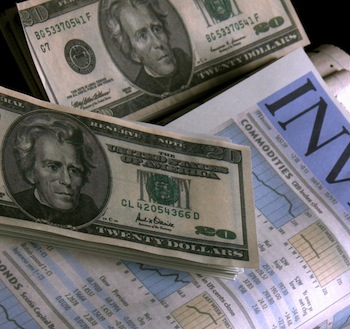Before you invest a single penny of your money into a potential stock, bond, project, or other asset, there are two questions you should ask yourself. These two questions could have saved a lot of investors from asset bubbles and bankruptcy court.
#1 – Does the Investment Offer an Adequate Rate of Return All Things Considered?

There are two important questions investors should ask themselves before they invest a single penny of the money in their portfolio. These two questions are at the very core of good portfolio management and involve the return you can earn, adjusted for taxes and inflation, and the risk to your well-being in the event of a loss. Image © Jupiterimages/Photos.com/Thinkstock
When you invest your money, what you are really after is to increase the purchasing power your family has. You aren’t interested in dollars or yen, pound sterling or euros, you want purchasing power. You want to be able to buy more cheeseburgers and furniture, cars and televisions, vacations and clothing, jewelry and tickets to your favorite entertainment events. In the investing world, it pays to remember that is your goal. Sometimes, it can be easy to lose sight of that, which explains why foolish investors are buying 30-year Treasury bonds at prices that are virtually guaranteed, in my opinion, to destroy their wealth.
One way of putting this when it comes to stocks or any other sort of operating assets was spelled out by Lawrence Cunningham when discussing the writings of famous investor Warren Buffett. To roughly paraphrase Cunningham, the investor’s objective could be stated as follows:
The job of an investor is to think about management, products, services, competitors, and capitalization structure. The primary question you are seeking to answer is, “Does the after-tax return on investment at least equal the purchasing power of the initial investment plus a fair rate of return?” The primary relevant factors are the long-term economic characteristics of the business, the quality and integrity of its management, and future levels of taxation and inflation.
That really is what it comes down to in the end. Does the potential investment you are considering offer a very high probability of returning the real inflation-adjusted purchasing power of your initial investment plus adequate compensation for the risk you took as well as the time you had to forgo the use of your capital instead of spending it?
Whenever you purchase an investment, that is what you are trying to answer in the affirmative. It doesn’t matter if you are talking about stocks, bonds, real estate, gold, silver, oil, intellectual property, collectibles, or baseball cards. Different investors use their temperament, knowledge, and experience to specialize in certain areas; for example, Phil Ruffin is probably going to manage a portfolio of real estate investments or actually operate a business better than Warren Buffett could, whereas in the stock market capital allocation game, Buffett is at his best.
#2 – If This Investment Lost 100% Of Its Value, Would My Standard of Living or Fortune Be Wiped Out?
No matter how lucrative an opportunity appears, no matter what the potential payoff for fame and fortune, once you have reached financial independence, I would never invest in a project or security that put my family in a position of having to “return to Go” in Monopoly parlance. Strange things happen. In order to prosper, you need to be able to financially survive those strange things. You can’t do that if your equity and cash flows are damaged in a major way. After all, going back to Warren Buffett, it is the cash generated from Berkshire Hathaway’s operating companies that provide him a steady stream of capital to redeploy, taking advantage of opportunities. You need your economic engine to remain intact so that it can churn out new capital.
Once you are rich, there is a temptation to get rich faster. That’s fine if you can do it without introducing wipe-out risk. But run from wipe-out risk. It is the big temptation that can undo decades of intelligent stewardship, disciplined saving, and wise investments. Your principal is sacrosanct. Protect it.


